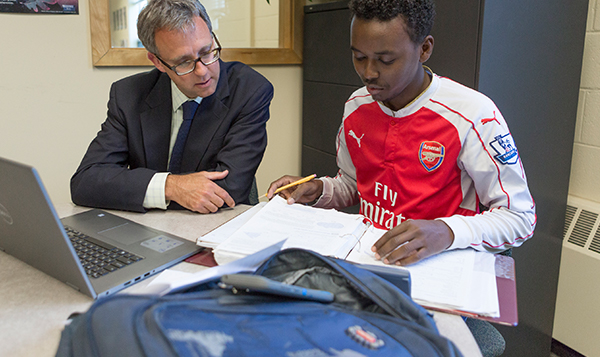This is a tough conversation. The numbers don’t lie, the ratio of housing prices to income quantifies how difficult it has become to afford a home. However – you knew that was coming – there are paths to home ownership. They may be longer, they may involve hard choices, but they exist.
Let’s talk about it. It’ll take two posts but issues this big need time and space.
Math and Economics
There are endless resources which highlight and prove what our eyes have been telling us for years—houses are expensive and incomes are not keeping up. Parts of Maine have been hit hard, especially since 2020, but the road we’re on started getting steeper well before the economic shocks related to the COVID pandemic. There are endless opinions and numbers to suggest why this has happened, but I dare sum it up in one powerful word: economics. I could go three words to be more specific: supply and demand. I can get even more specific by saying that demand exceeds supply and buyers have been willing and able to pay higher prices which makes them… Go even higher. Don’t get me started (today) on why this has happened although I’d love to dig into it someday.
And does it matter why it has happened to someone who is fighting this battle today? Not so much, I suspect. However, an understanding of the economic fundamentals that have brought us to this point can help us as we explore solutions both for ourselves and for the larger community in general.
Viewing Home Ownership Obstacles through a Generationally Diverse Lense
Yes, I am already a homeowner, and I benefited from the surge in real estate prices between 2000 and 2016 (when I sold my first home). So, to be fair, I cannot write this post solely from my point of view. I am trying to see this world through the eyes of someone who is looking at the market now, likely a first-time buyer, or someone who will be a first-time buyer someday. Someone like the high school and college students I teach or someone who wants to make the move from renting to owning. Someone like my 13-year-old who will, in a blink, start thinking about this. What would I tell them?
Again, it’s a tough conversation. But I want to talk about what can be done rather than add to the paralysis by analysis centered on what can’t be done.
To that end, I asked for input from those who are looking straight at this challenge in real time. Jaden Kyung-Moon Bauch is a financial educator, a 2025 graduate of The Maine College of Art & Design, has passed several key investing exams including Series 65 and Series 7, is studying to become a Certified Financial Planner, and was interviewed for one of my previous posts. She also authors an Instagram account and website loaded with old school financial advice presented through a new school voice – @TheFinancialPalette and https://www.thefinancialpalette.org/.
“Student loan debt, rising car prices, and increasing rent all make saving for a down payment feel nearly impossible. On top of that, there’s often a lack of education around what homeownership actually entails. Many people assume that putting 5% down is enough and that it’s fine because it gets them in the door, without fully understanding the long-term costs and risks. I also see people underestimate the true cost of owning a home, thinking it’s just the mortgage payment, when in reality maintenance, repairs, taxes, and insurance add up quickly. A similar mindset shows up with rental properties as well.
All of this contributes to a broader sense of pessimism. When young people feel shut out of such a major milestone, it compounds into deeper frustration with the system and the economy as a whole.”
Wow. Exactly.
Jaden continues, “I really encourage people to look at the broader structural issues, but also to focus on what’s within their individual control. That means doing the math honestly and, when possible, sitting down with a professional to explore what paths might exist.
The reality is that things are not fair for our generation. But I think it’s important to focus on what we can do about it, both individually and collectively, and to invest in education as a form of empowerment rather than resignation.”
Wow again. Timeless wisdom.
“When young people feel shut out…”
That’s a powerful phrase, especially the word feel. To feel shut out from home ownership is a real psychological barrier based on the reality of the numbers. But Jaden responds with the idea, “to invest in education as a form of empowerment rather than resignation.”
But how? I often mention psychology in my posts related to financial behavior and wellness, but I am not a psychologist and cannot offer that kind of advice. However, I can talk about concrete actions and strategic habits that can help with Jaden’s point about education leading to empowerment.
Financial Decisions Always Involve Choice
Every era, every generation, all of us, face particular challenges when it comes to our finances. For my parents, an objective look at the numbers says it wasn’t as hard for them to get their first home than it will be for someone in 2026 or for my son in 2036 or so. But I can tell you that it didn’t feel that way for my folks (imagine buying a home with interest rates in the teens!) It seemed like a mountain and to climb it they had to make lifestyle choices for many years. They drove old cars; their kids had a lot of secondhand clothes when secondhand clothes weren’t cool; we rarely ate at restaurants; vacations were road trips in crowded cars to see family rather than flights and hotel stays.
In the abstract sense, it’s no different now. Yes, the road is more difficult in terms of pure dollars, and it may take longer to navigate, but the set of choices is similar.
Home-Buying Considerations
Before getting to the tips and strategies, here are some other concepts to consider.
- The impact of credit score.
For most of us, buying a home will be the most significant use of credit in our lives, and for that purchase, credit score will have a huge effect on our ability to not only afford a house but to also manage the financial fallout. For example, if the best interest rate available on a 30-year mortgage is 6%, that rate will go to the borrowers with the best credit scores, the A+ scores—generally 750 or higher. For the same loan, a score of 650 will generally mean a 1% higher rate, which over the life of the loan will add up to more than $100,000 in additional interest. 100-point differences in credit score typically move the rate about 1%, which means about $100,000 over a 30-year note. Not a set rule, but the math usually lands in that ballpark. - Downpayments and PMI or private mortgage insurance.
For the most part, a 20% downpayment is needed to get a standard mortgage and that means a mortgage that does not require PMI. PMI protects the lender in case the borrower cannot pay. Let’s put on our economist’s hat and do a quick analysis. On the one hand, PMI can make home ownership more accessible as it allows for lower down payments. On the other/trickier hand, PMI is expensive (typically hundreds of dollars/month), and it is pure cost to the borrower, the only benefit being a less than 20% down payment. Once a mortgage is paid down so that the LTV (loan to value ratio) hits that 20% mark, PMI can be cancelled, but the ultimate cost for a homeowner can be in the thousands. - 30 years versus 15 years.
Getting a manageable monthly payment is at or near the top of everyone’s list. However, it’s important to understand the impact of compound interest in a 30-year versus a 15-year mortgage. It’s massive, often measured in amounts of more than $100,000.
We’ll take a break right here while I put together more information and specific tips for part two of this post.
Another thank you to Jaden Kyung-Moon Bauch and additional thanks to Hannah Finegold at Hannah Finegold Real Estate at Real Broker, LLC, for sharing her experience and advice on buying a house. (Hannah is my former student from Waynflete, and Jaden is a former student and co-teacher from Maine College of Art & Design)




